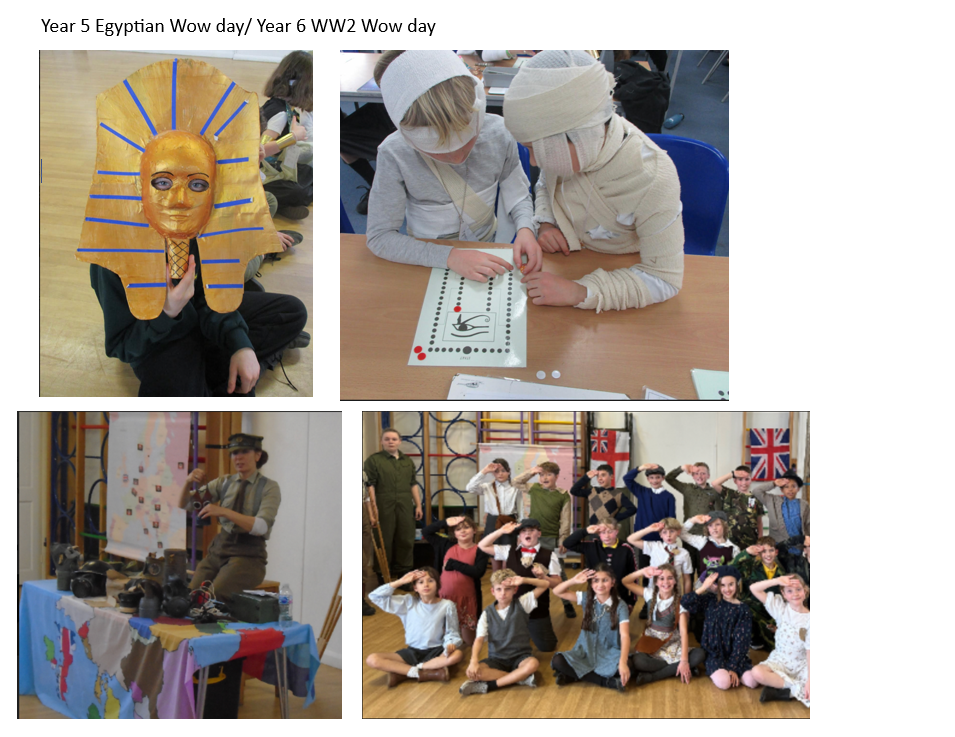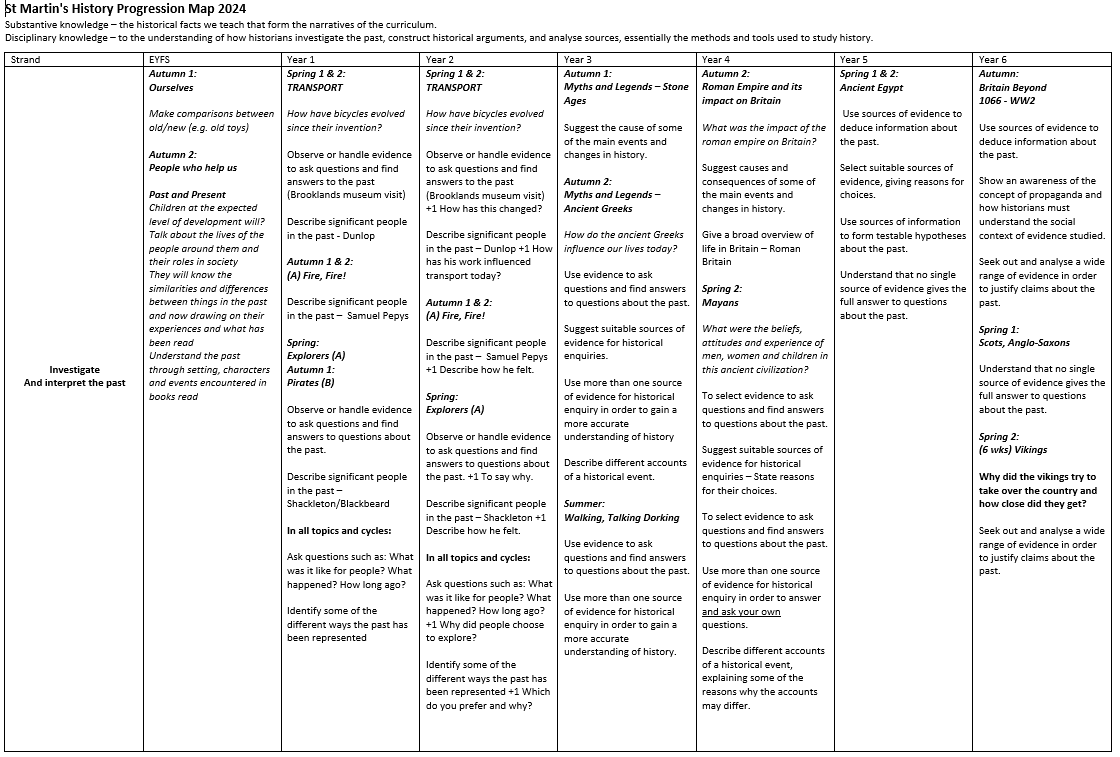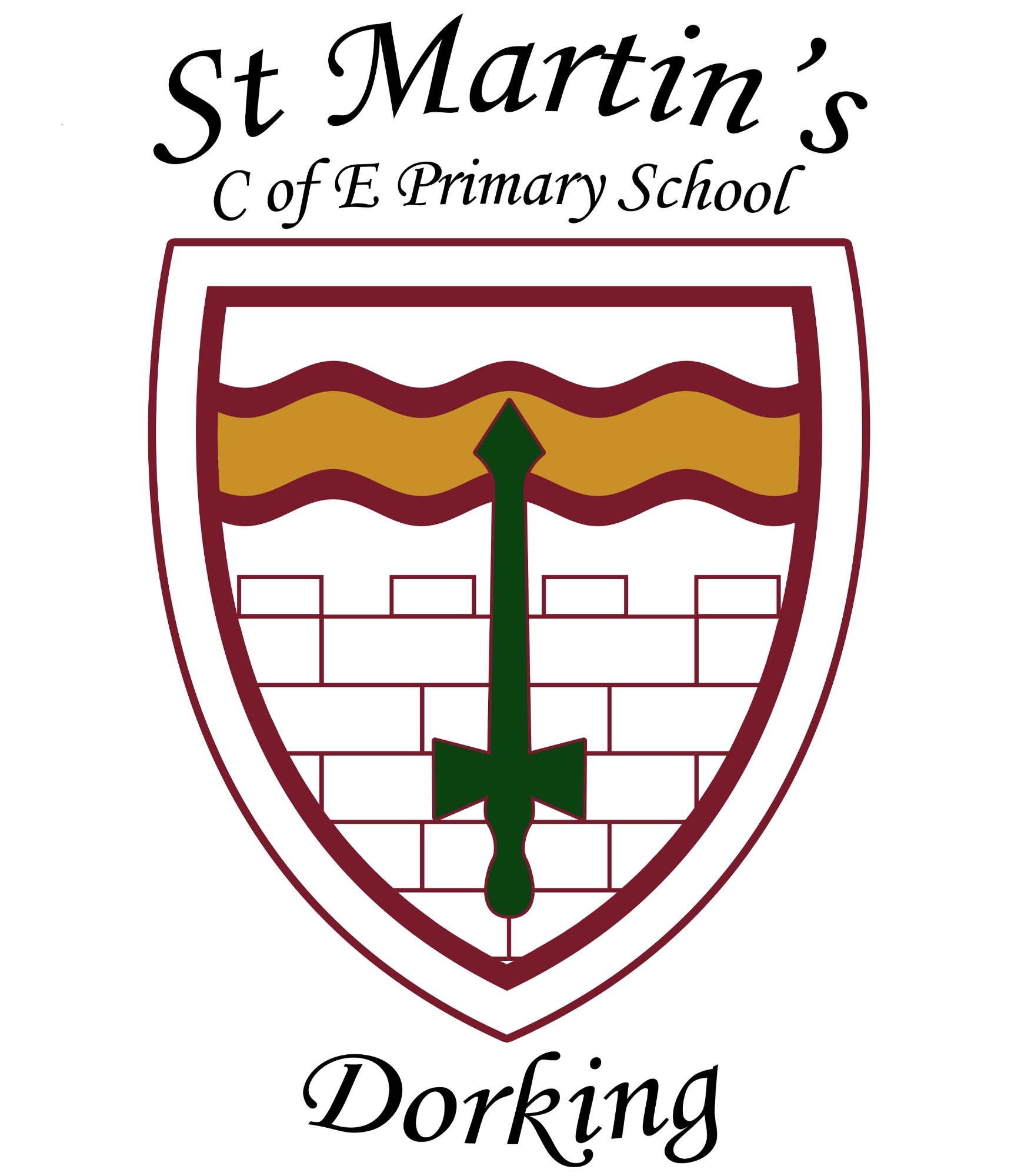History
The Intent, Implementation and Impact of our Curriculum
History
Intent – What does History look like at St Martin’s?
Our aim at St Martin’s Primary School is to offer high quality teaching that will encourage pupils to develop an appreciation and understanding of Britain’s past and that of the wider world and keep them actively engaged throughout their learning. Our historians will be inspired to use their curiosity to make links to the past. Teaching will equip pupils to ask perceptive questions, think critically, weigh evidence, sift arguments and develop perspective and judgement and nurture their historical enquiry. History is key to helping pupils to understand their own identity within our diverse social, political and culturally varied society.
Implementation – how are we going to deliver this?
At St Martin’s, we ensure the school provides full coverage of the National Curriculum (2014) programme of study for History and Understanding of the World in the Early Years Foundation Stage.
In the Early Years History is not taught as a discreet lesson. It can make an active contribution to all areas of learning but makes an important contribution to Understanding the World and Communication and Language and Literacy. History in our early years setting involves exploring the child’s world (past and present), helping them to make sense of their community and the world in which they live.
Our History curriculum in Years 1 to 6 ensures knowledge is built on year by year and sequenced appropriately, and chronologically, to maximise learning for all children through the use of the Chris Quigley milestones. These are broken into four strands:
1. To investigate and interpret the past.
2. To build an overview of world history.
3. To understand chronology.
4. To communicate historically.
It is important that the children develop the knowledge required of a historian throughout their time at St Martin’s and do not just learn a series of facts about the past. In History, the children will develop their substantive knowledge: the facts and figures of history alongside disciplinary knowledge: the skills required to research, interpret (including primary and secondary sources), understand and analyse. This supports the children at St Martin’s, being able to find evidence, weigh it up and reach their own conclusions, skills that will help them in their adult life. All learning will start by revisiting prior knowledge. This will be scaffolded to support children to recall previous learning and make connections. Staff will model explicitly the subject-specific vocabulary, knowledge and skills relevant to the learning to allow them to integrate new knowledge into larger concepts while ensuring misconceptions are dispelled. This will also be supported with a timeline that follows the children through their time at St Martin’s and displays the historical periods and events they are learning. Each new topic is added to the timeline thus allowing the children to place themselves and their learning in the context of the chronology that is such an important theme in History. Learning will be supported using knowledge organisers that provide children with scaffolding that supports them to retain new facts and vocabulary in their long-term memory. Knowledge organisers are used for pre-teaching, to support home learning and also as a part of class reviews.
Although all lessons are created and delivered around an enquiry-based question, at least one lesson per topic will be purely devoted to source analysis. The children will be allowed to explore artefacts, photos or secondary sources to not only understand the period or event they are from, but also to examine how useful or biased a source can be.
Children will not just learn in discreet History lessons but also across the curriculum in Literacy topics that, where possible, interact with the History learning for example Year 1 looking at ‘Mrs Armitage on Wheels,’ in conjunction with their History learning about transport; Year 6 using ‘The Lion and the Unicorn’ to help inform their History of World War Two and their understanding of evacuation and the blitz, create meaningful links all the way through the school.
Impact – What difference is this curriculum making to our children?
By the end of their time at St Martin’s, children will have developed:
• A secure knowledge and understanding of people, events and contexts from the historical periods covered.
• The ability to investigate, interpret and evaluate others accounts of the past using detailed, appropriate and accurate historical evidence taken from a range of sources.
• A respect for World History through the chronology of historical evidence, and the ability to make meaningful and critical use of it to support their explanations.
• A passion for History and an enthusiastic engagement in learning, which develops their sense of
curiosity about the past and their understanding of how and why people interpret the past in different ways.
• A desire to embrace challenging activities, including opportunities to undertake high-quality research across a range of history topics.
• The ability to think critically about History and communicate confidently in styles appropriate to a range of audiences.
EYFS – Understanding the World (Department of Education, Development Matters, Revised 2023)
Understanding the world involves guiding children to make sense of their physical world and their community. The frequency and range of children’s personal experiences increases their knowledge and sense of the world around them from visiting parks, libraries and museums to meeting important members of society such as police officers, nurses and firefighters. In addition, listening to a broad selection of stories, non-fiction, rhymes and poems will foster their understanding of our culturally, socially, technologically and ecologically diverse world. As well as building important knowledge this extends their familiarity with words and supports understanding across domains. Enriching and widening children’s vocabulary will support later reading comprehension.

In Reception children will be learning to:
*Talk about members of their immediate family and community.
*Name and describe people who are familiar to them.
*Comment on images of familiar situations in the past.
*Compare and contrast characters from stories, including figures from the past.
*Draw information from a simple map.
*Understand that some places are special to some members of their community.
*Recognise that people have different beliefs and celebrate special times in different ways.
*Recognise some similarities and differences between life in this country and life in other countries.
*Explore the natural world around them.
*Describe what they see, hear, and feel whilst outside.
*Recognise some environments from the one they live in.
*Understand the effect of the changing seasons on the natural world around them.
WOW Days
St Martin’s School has a long and valued tradition of bringing learning to life through our WOW days. These are our educational experience days that celebrate learning. Pupils dress up, have real-life hands-on experiences and broaden their understanding of the curriculum. We are very lucky to have the support of our Parent Association in helping us to deliver these fantastic days. Children take part in a number of WOW days throughout their time here: from The Great Fire of London workshop in Year 1, to Viking Day in Year 6, complete with shields and raids.
WOW days can link to many areas of the curriculum including History, Geography, and Science. The days are carefully planned as part of our learning sequences to enhance our pupil’s learning and ensure children remember more about the subjects they study.
We see many benefits to pupils because of our WOW days. They bring learning to life, deepening children’s subject knowledge and enhancing our core curriculum offer. Pupils really enjoy WOW days and the hands-on activities, which in turn allows them to make memories that last a lifetime.






